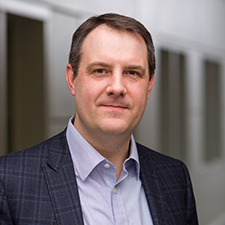
Creighton announces new Institute for Population Health

Creighton University’s newly established Institute for Population Health will target issues of health justice in healthcare and in the community.
The institute’s creation was announced on Tuesday, Sept. 5, during a University Town Hall address on Creighton’s Omaha campus by President the Rev. Daniel S. Hendrickson, SJ, PhD. A Town Hall is planned for the Phoenix campus community on Thursday, Sept. 7.
“The Institute for Population Health embodies our mission of service and justice, bringing together our Creighton community with our partners to identify concrete solutions that enhance individual well-being and eliminate systemic barriers to health equity broadly,” said Fr. Hendrickson. “This is an exciting opportunity for our University to venture into this growing field and, guided by our Jesuit, Catholic foundations, build a better world for all.”
A Passion for Population Health

Through the new institute, headed by Executive Director Scott Shipman, MD, MPH, and operating under the Office of the Provost, Creighton will use its wide-ranging expertise to generate ideas and policies designed to improve healthcare outcomes in Nebraska and across the United States. The institute will display a spirit of innovation, working with all Creighton’s schools and colleges to benefit undergraduate, graduate and professional education and research while making contributions to scholarship and service that extend to the wider society.
“Dr. Shipman is an accomplished leader in his field who understands that improving the health of populations requires a collaborative, multidisciplinary approach that goes beyond our traditional model of healthcare,” said Provost Mardell Wilson, EdD, RDN. “Through the work of the institute and its campus and community partners, not only will our communities benefit, but so too will our students, who will find opportunities to engage this dynamic, emerging field.”
Shipman comes to Creighton from the Association of American Medical Colleges (AAMC) in Washington, D.C., where he served as director of clinical innovations, providing leadership in promoting health policy and high-value clinical models. He earned his medical degree from the University of Nebraska Medical Center in 1995, trained in pediatrics at Dartmouth and completed a fellowship at Johns Hopkins, where he was a Robert Wood Johnson Clinical Scholar and received a master’s degree in public health. He was named the inaugural holder of the CyncHealth Endowed Chair for Population Health at Creighton in September 2022.
U.S. Falling Behind, Rural Populations a Challenge
Creation of the new institute is motivated by the continuing failure of the U.S. healthcare system to produce results commensurate with the amount of money invested. More than $4.3 trillion was spent on healthcare in the United States in 2021, which represents 18.3% of the entire U.S. gross domestic product. Per capita expenditure is 60% above the average of seven affluent G7 countries and yet the United States experiences the lowest life expectancy, a worsening deficit with recent declines in U.S. life expectancy that predate the pandemic.
In addition, the difficulty of accessing healthcare remains a national challenge, and is a particular threat for rural populations. The U.S. Centers for Disease Control and Prevention estimates that more than 46 million Americans, about 15% of the population, live in rural areas and that rural residents are more likely to die from heart disease, cancer, unintentional injury, chronic lower respiratory disease and stroke than their urban counterparts. In Nebraska, according to the Nebraska Department of Health and Human Services, 35% of the population lives in rural areas, more than double the national average.
The institute’s work will be guided by the understanding that 80% of the factors that determine health outcomes can be attributed to social and economic factors such as health behavior and physical environment, while the remaining 20% can be attributed to factors affected by healthcare.
Institute to Focus on Health Inequities
Shipman says the institute will focus particular attention on better understanding and addressing the factors driving widespread health inequities and inequities in access to high-quality healthcare.
“Building on assets and overcoming barriers to health, in partnership with others committed to working alongside populations who disproportionately suffer from injustices in health and healthcare, will be a central mission of the institute,” says Shipman.
Shipman will work in partnership with CHI Health and with CyncHealth, an agency that provides healthcare data to providers throughout Nebraska. Key to improving healthcare outcomes through the state will be leveraging data to drive action, and partnering with a range of influential community sectors, he says.
“You have to truly understand the problem starting with existing data and studying disparities through that data,” he says. “But data is only as useful as what you do with it, so we need to dig deeper and engage with underserved communities so that we learn from them directly.”
Symposia Spurring Dialogue with National, Local Leaders
Along with Waddah Al-Refaie, MD, FACS, chair of the Department of Surgery at Creighton, Shipman welcomed experts from multiple states on Friday, Sept. 8, when Creighton hosted the inaugural Creighton-CHI Health Equity in Rural Surgery Symposium at the Marriott hotel in downtown Omaha.
The symposium, jointly designed by the Creighton University School of Medicine, CHI Health and the Creighton University Office of Continuing Education, discussed surgical equity, rural surgery workforce trends and their implications, the state of rural healthcare in Nebraska, clinical innovations in providing rural care, research opportunities and workforce training innovations that might boost rural access to care and surgical services.
The University will host a second symposium Oct. 23-24 that will include national experts on population health and breakout sessions involving Creighton faculty and community leaders. Fr. Hendrickson, Creighton Provost Mardell Wilson, EdD, RDN, and Dean of the Creighton School of Medicine Robert “Bo” Dunlay, MD’81, will participate, along with other Creighton leaders and local dignitaries.
“We will bring together leading thinkers both regionally and nationally to share their insights about priorities in policy, healthcare and community health” Shipman says. “It’s an opportunity to raise awareness, identify best practices, and begin to chart our course to have an impact in Omaha, in Nebraska and beyond.”
The symposium – titled Building Bridges for Healthier Communities – is open to the public, and registration and more information can be found online.
















